How Yoga Supports Physical and Emotional Healing in Recovery

Introduction to Yoga's Role in Recovery
Yoga has long been celebrated for its holistic approach to wellness through a combination of physical postures, breathwork, and meditation. Particularly in recovery from addiction, trauma, and other mental health challenges, yoga supports both physical and emotional healing. This article explores how yoga aids in overcoming these hurdles, promoting overall well-being and emotional stability.
Enhancing Emotional Wellness in Recovery
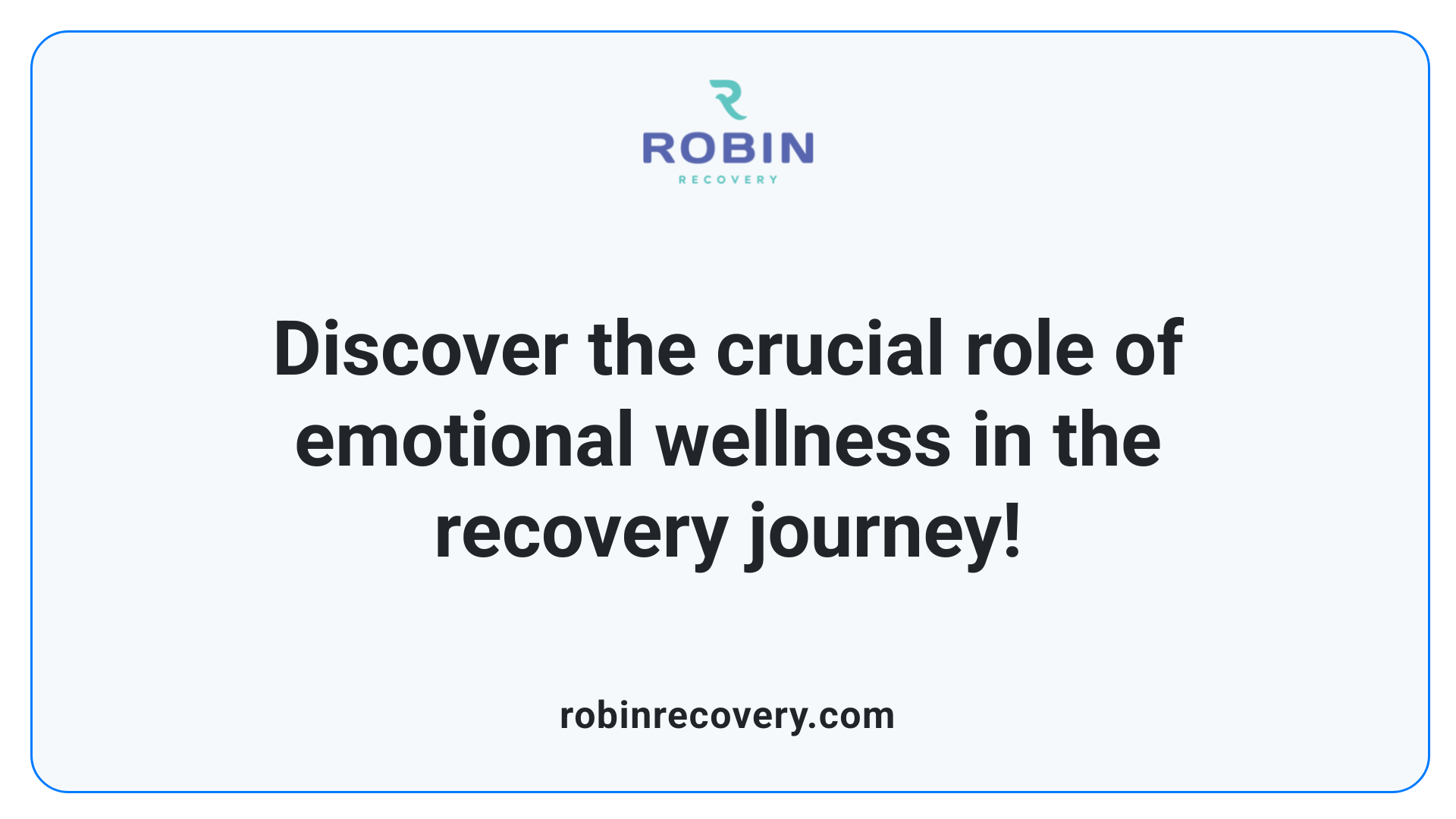
What are the benefits of emotional wellness in recovery?
Emotional wellness plays a pivotal role in the recovery process from co-occurring disorders and various mental health challenges. By equipping individuals with tools to manage stress effectively, emotional wellness fosters resilience during times of change. This adaptability helps build enhanced coping skills and encourages the development of supportive social connections, which are vital in the recovery journey.
Indicators of emotional wellness include the ability to express feelings, manage losses, and maintain healthier relationships with others. These components support a greater overall mental health status and can lead to improved life satisfaction.
Conversely, poor emotional wellness can exacerbate challenges in both personal and professional contexts, leading to increased illness and dysfunction. By incorporating emotional health into treatment plans, individuals not only address the psychological aspects of their conditions but also significantly improve their quality of life. The importance of developing emotional wellness cannot be overstated; it is an essential facet of effective recovery that contributes to lasting mental health improvements.
Importance in mental health recovery
By focusing on emotional wellness, individuals can explore and process difficult emotions, enhancing their ability to react positively to various situations encountered during recovery. This approach aids individuals in unpacking emotional triggers tied to their experiences, encouraging the healing of past traumas and fostering a greater understanding of their emotional landscape.
Impact on relationships and stress adaptation
Strengthening emotional wellness additionally cultivates supportive relationships, which serve as critical pillars during recovery. These connections help individuals navigate stress and adapt constructively to changes, leading to a healthier social environment that encourages ongoing support and stability. Such nurturing relationships enhance one’s resilience and provide necessary reassurance during challenging moments in the recovery process.
The Emotional Support Yoga Offers
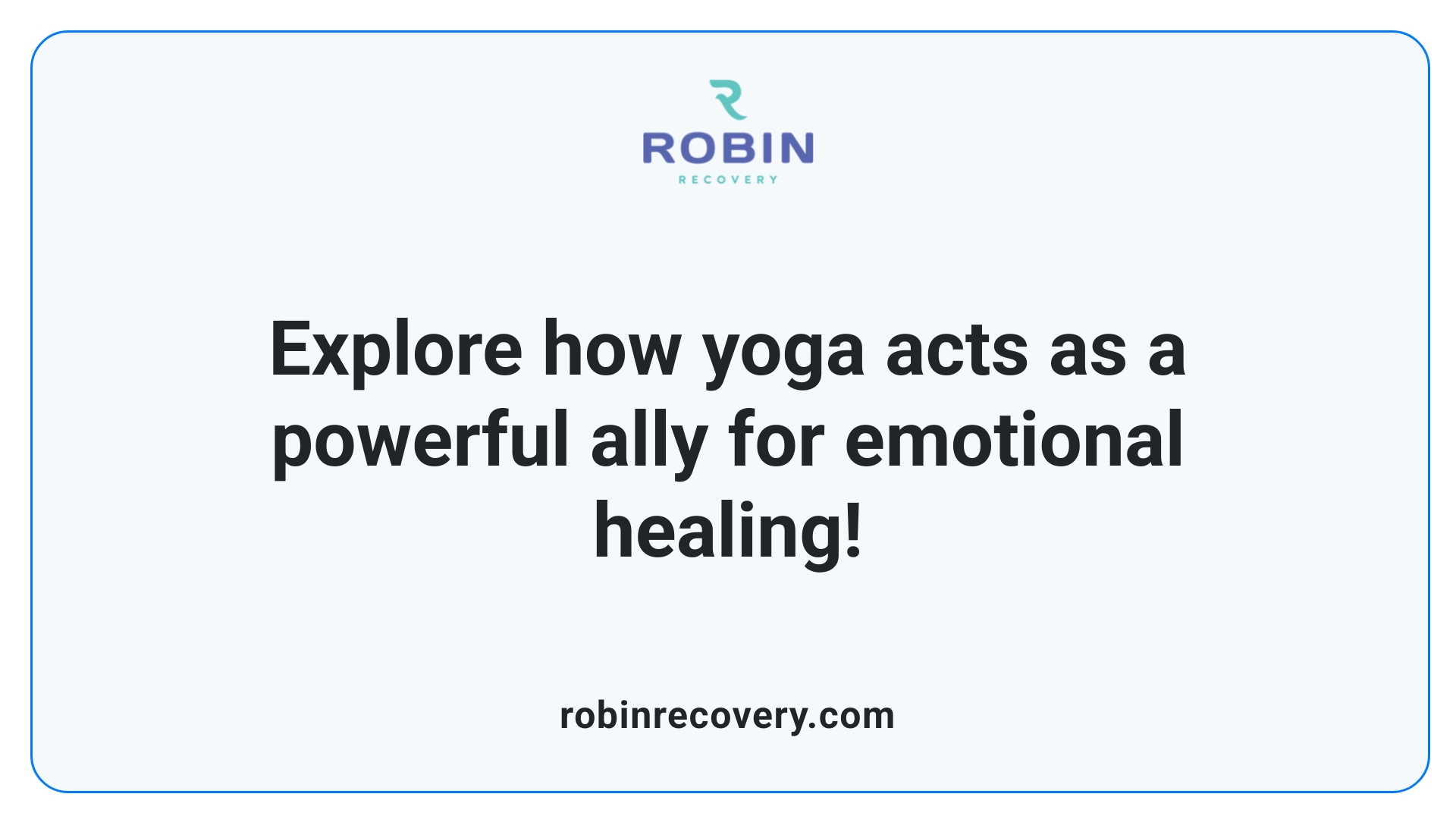
Yoga's impact on emotional health
Yoga stands as a powerful tool for emotional healing, integrating physical postures, breathing exercises, and meditation to foster well-being. It effectively lowers stress hormones like cortisol while simultaneously ramping up beneficial brain chemicals such as endorphins and gamma-aminobutyric acid (GABA). This unique combination not only alleviates anxiety but also uplifts mood, creating a sense of emotional stability.
Engaging consistently in yoga is associated with slowing age-related cognitive decline, aiding memory and focus. With its holistic approach, yoga supports emotional regulation, self-acceptance, and mindfulness, making it accessible for individuals on varying paths of recovery.
Mechanisms of emotional benefit
The emotional benefits of yoga are deeply rooted in its physiological effects on the body. By activating the parasympathetic nervous system, yoga fosters relaxation, countering negative emotions such as depression and anger. This activation transforms how practitioners handle stressors, contributing to a regulated nervous system and improved emotional resilience.
Moreover, specific yoga practices can unlock held emotions in the body, facilitating the release of stress and trauma, thus promoting healing from within.
Specific techniques for emotional growth
Several techniques within yoga specifically target emotional growth. Breathwork, or pranayama, encourages mindfulness and present-moment awareness, helping practitioners to manage intrusive thoughts and cravings associated with addiction or anxiety. Similarly, restorative practices like Yoga Nidra and mindful movement cultivate a calming state, improving sleep quality vital for emotional recovery.
Techniques such as mindful meditation and guided imagery can also significantly enhance emotional self-awareness, aiding individuals in recognizing triggers and managing their emotional responses effectively. As emotional growth develops, so does the overall sense of well-being, contributing positively to the journey of recovery.
Physical and Mental Health Benefits of Yoga
How does yoga provide both physical and mental health benefits?
Yoga provides both physical and mental health benefits through its integration of breathing exercises, meditation, and various postures. Physically, it increases flexibility, strength, and respiratory capacity, improves cardiovascular health, and aids in weight reduction while offering protection from injuries. Mentally, yoga is effective for managing stress, enhancing mental clarity, and fostering a positive outlook on life. Regular practice leads to greater body awareness, helping individuals detect health issues early.
Regular engagement in yoga helps regulate cortisol levels, significantly lowering stress and anxiety. This is vital for individuals facing recovery challenges. The practice enhances self-awareness by cultivating mindfulness, allowing practitioners to recognize emotional triggers that may lead to stress or cravings.
Yoga's postures and breathing techniques also stimulate physical healing. Improved circulation and enhanced muscular strength can alleviate physical discomfort associated with substance abuse. A reduction in tension promotes relaxation and supports better sleep patterns, thus addressing common concerns for those in recovery.
Together, these benefits cultivate a harmonious balance between mind and body, supporting the body's self-healing capabilities and fostering emotional resilience, crucial for those recovering from addiction.
More Information:
- Comprehensive Health Benefits: Yoga boosts overall well-being, contributing positively to mental health, emotional balance, and physical strength.
- Integration of Yoga Elements: It harmoniously combines meditation, breathing techniques (pranayama), and physical postures to create a holistic recovery approach.
- Impact on Physical and Mental Well-Being: With its multifaceted benefits, yoga not only enhances physical attributes but also nurtures mental health, making it a vital tool in the recovery process.
Yoga as a Complement in Addiction Recovery
How can yoga aid in addiction recovery?
Yoga plays a pivotal role in addiction recovery by providing a holistic approach that complements traditional treatment methods. It helps individuals manage stress, which is often a primary trigger for substance use. Through the integration of physical postures, relaxation techniques, and mindfulness, yoga encourages the release of mood-enhancing chemicals like dopamine and serotonin. This neurochemical boosting aids in emotional regulation and can significantly reduce cravings.
Moreover, yoga teaches essential mindfulness practices that allow individuals to observe their thoughts and feelings without judgment. This awareness fosters self-control, empowering individuals to avoid harmful substances and stay focused on their recovery goals.
Yoga sessions, especially those tailored for addiction recovery, often involve breathwork and meditation, which help reduce anxiety levels and promote emotional stability. By improving physical fitness through increased strength and flexibility, yoga not only contributes to a healthier lifestyle but also enhances self-confidence—essential components in the journey towards sustained recovery.
Benefits of Yoga in Recovery How It Works Impact on Recovery Stress Reduction Lowers cortisol levels, alleviating stress reactions Decreases risk of relapse Emotional Regulation Fosters self-awareness of triggers and emotions Improves long-term coping strategies Mental Well-being Enhances mood through neurochemical balance Supports overall recovery process Physical Fitness Increases strength and flexibility Boosts self-esteem and encourages healthier habits
The Science Behind Yoga's Healing Properties
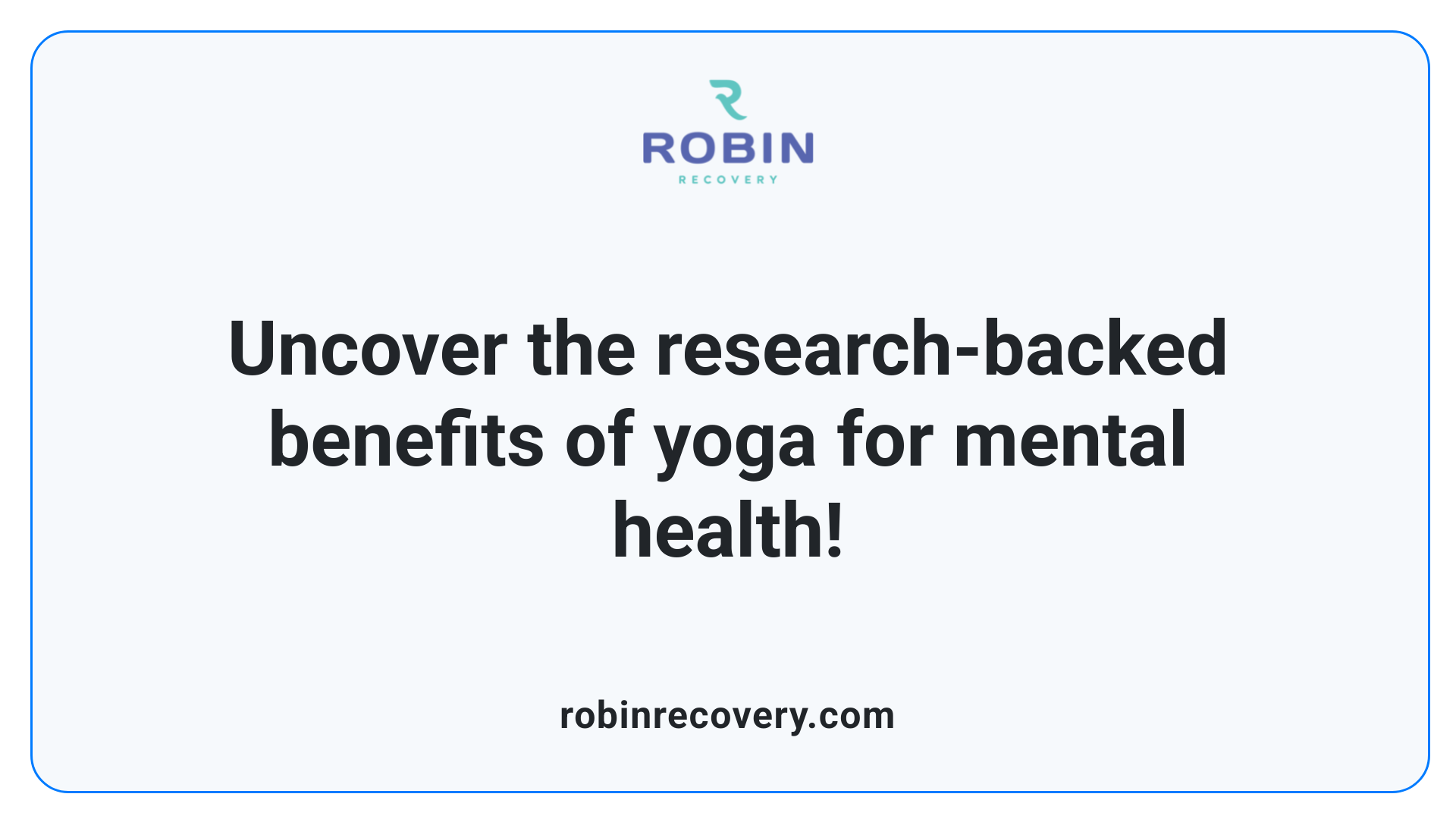
Scientific studies supporting yoga's effectiveness
Numerous scientific studies underline the benefits of yoga in mental health recovery. For instance, research highlights that regular yoga practice significantly reduces anxiety, depression, and stress levels. A 2016 study noted that college students experiencing anxiety or depression showed improvement after participating in yoga sessions over eight weeks, demonstrating its efficacy in managing mental health challenges.
Impact on neuroplasticity and stress hormone reduction
Yoga is particularly noteworthy for enhancing neuroplasticity, which allows the brain to establish healthier connections. This is crucial for those overcoming addiction and negative thought patterns. Furthermore, yoga reduces cortisol levels—the body's main stress hormone—leading to lower stress and improved emotional stability. As cortisol levels decrease, individuals often experience a reduction in withdrawal symptoms, enhancing their recovery journey.
How yoga aids mental health recovery
Through practices like mindfulness, breath control, and physical postures, yoga promotes emotional regulation and self-awareness. Individuals learn to manage cravings and recognize emotional triggers, essential skills in preventing relapse.
Additionally, yoga encourages a holistic recovery approach by addressing physical, emotional, and spiritual needs collectively. Many rehabilitation centers incorporate yoga therapy into treatment plans, which has been shown to reduce cravings and improve overall mental well-being.
Trauma Recovery and the Power of Yoga
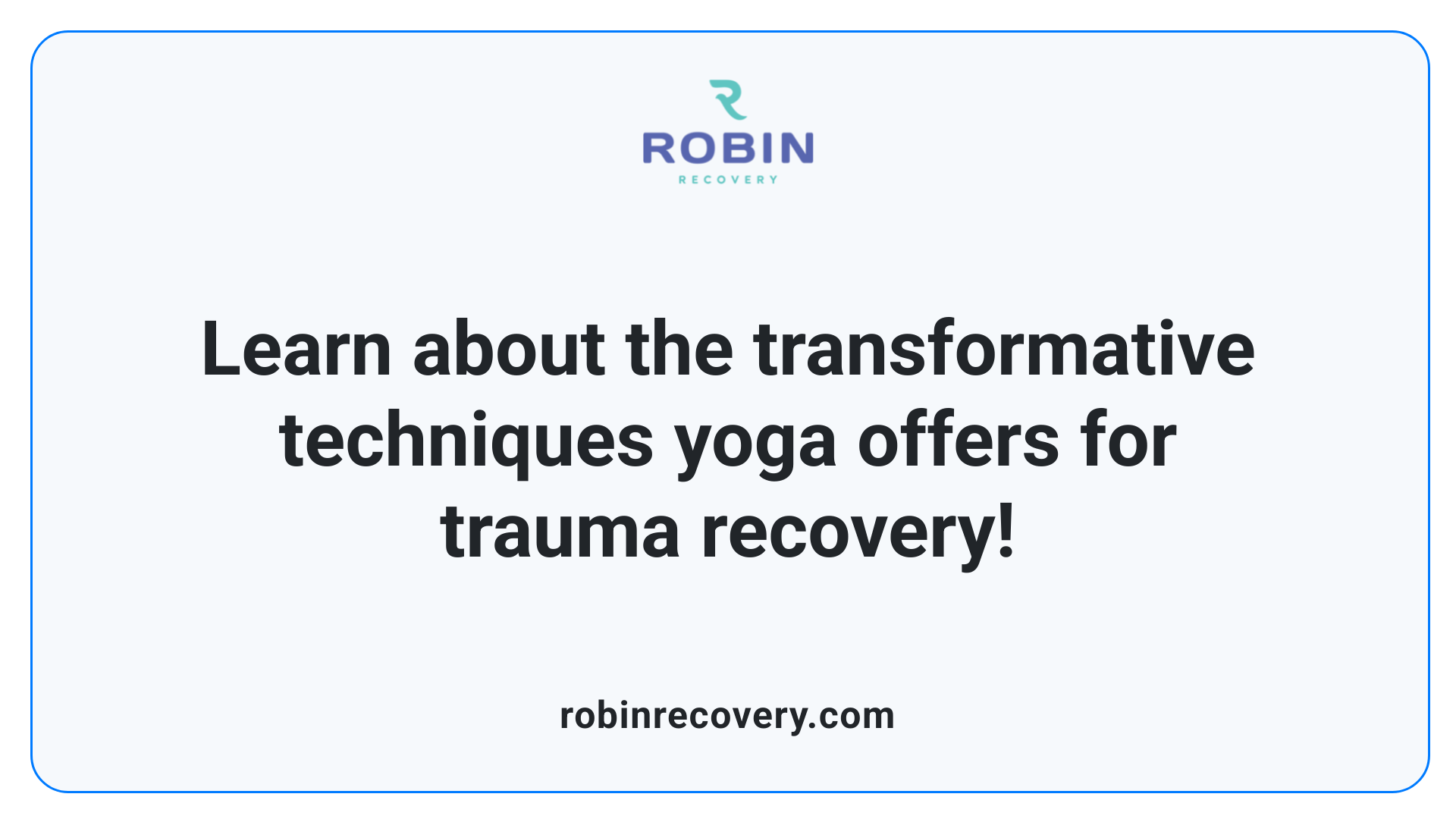
Yoga Techniques Beneficial for Trauma Recovery
Yoga offers a variety of techniques that aid in trauma recovery, promoting emotional and physical healing. Techniques such as breathwork (pranayama) and mindful asanas encourage individuals to reconnect with their bodies and emotions. Specific poses like Pigeon and Cobra target tension often held in areas affected by trauma, fostering release. These practices not only enhance flexibility and strength but also allow practitioners to process buried emotions linked to their experiences.
Integration of Mindfulness and Trauma-Informed Practice
Incorporating mindfulness into yoga creates a safer environment for individuals dealing with trauma. Mindfulness helps practitioners cultivate present-moment awareness, reducing anxiety and intrusive thoughts. Trauma-informed yoga acknowledges the complexities of trauma, integrating compassionate approaches that allow participants to explore their experiences without judgment. This supportive framework encourages emotional regulation—essential for managing triggers during recovery.
Physical and Emotional Healing Post-Trauma
Post-trauma, individuals often struggle with disconnection from their bodies. Yoga facilitates a reconnection that is crucial for healing, promoting self-compassion and reducing self-judgment. The integration of physical movement with mindful breathing enhances overall well-being, improving sleep quality and emotional resilience. Regular practice not only supports the healing of physical symptoms linked to trauma but also stabilizes mood and strengthens mental health, contributing positively to the recovery journey.
Integrating Yoga with Traditional Treatment Methods
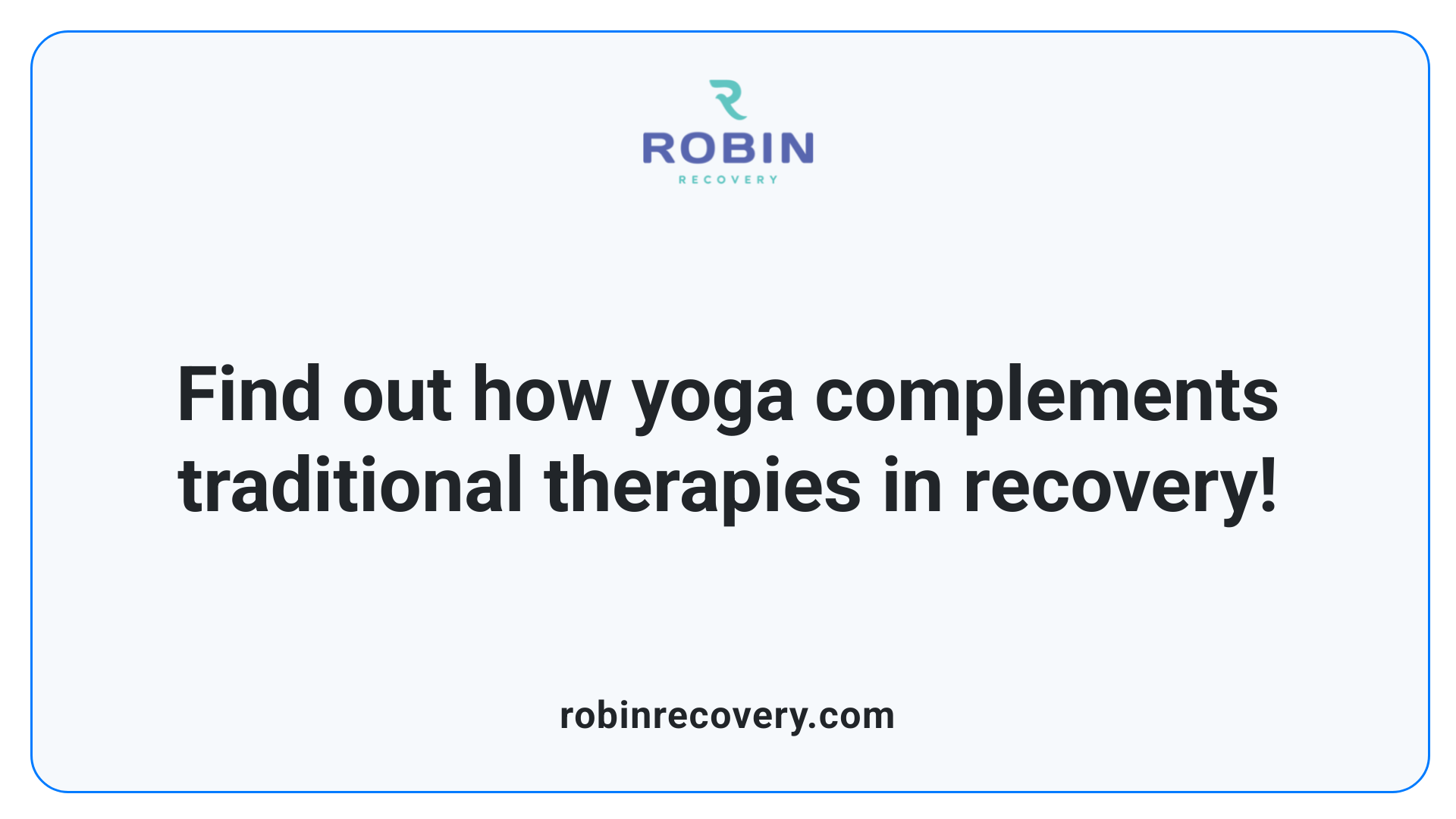
Holistic Approach and Integration with Treatments
Yoga is increasingly recognized for its holistic benefits in recovery, effectively complementing traditional treatment methods such as Cognitive Behavioral Therapy (CBT) and Dialectical Behavior Therapy (DBT). By incorporating yoga’s physical postures, breathing techniques, and meditation, individuals can address emotional, spiritual, and physical pain concurrently, enhancing overall healing. Many treatment centers have begun integrating yoga as a fundamental part of recovery programs, acknowledging its role in fostering self-awareness and emotional resilience.
Benefits in Managing Withdrawal and Cravings
The practice of yoga offers significant advantages in managing withdrawal symptoms and cravings. Regular yoga sessions are linked to reduced cortisol levels, alleviating stress that often accompanies withdrawal. Additionally, mindfulness cultivated through yoga helps individuals recognize and cope with cravings, providing healthier alternatives to substance use. Techniques like breathwork and mindful movement are particularly effective in reinforcing emotional regulation, which assists individuals in navigating their recovery journey.
Community Support and Emotional Regulation
Group yoga classes foster a sense of community that is invaluable for individuals in recovery. Participating in these sessions enhances feelings of belonging and connection, which can significantly improve mental health outcomes. Through shared experiences, support from peers becomes a powerful tool in emotional regulation, allowing participants to feel less isolated in their struggles. Overall, the integration of yoga and community support creates a nurturing environment that promotes sustained recovery.
Embracing Yoga in the Recovery Journey
Yoga stands as a powerful ally in the recovery journey, offering a profound impact on both physical and emotional health. Its holistic practices, melding breath, movement, and mindfulness, provide a comprehensive approach that complements traditional therapies, enhances recovery outcomes, and promotes overall well-being. Through yoga, individuals in recovery can foster resilience, self-awareness, and emotional regulation, paving the way for a healthier, more fulfilling life.
References
- How Yoga Enhances Mental Health and Recovery
- The Healing Power of Recovery Yoga: Blending Mindfulness and ...
- Benefits of Yoga in Addiction Recovery - Positive Sobriety Institute
- Exploring the therapeutic effects of yoga and its ability to increase ...
- Role Of Yoga Therapy In Addiction And Mental Health
- The Healing Power of Yoga: Holistic Approach to Trauma Recovery
- How Yoga Helps in Addiction Recovery
- Yoga for Emotional Healing - Aura Wellness Center
